人教版(2019)选择性必修 第一册Unit 1 People of Achievement非限制性定语从句课件(47张)
文档属性
| 名称 | 人教版(2019)选择性必修 第一册Unit 1 People of Achievement非限制性定语从句课件(47张) | 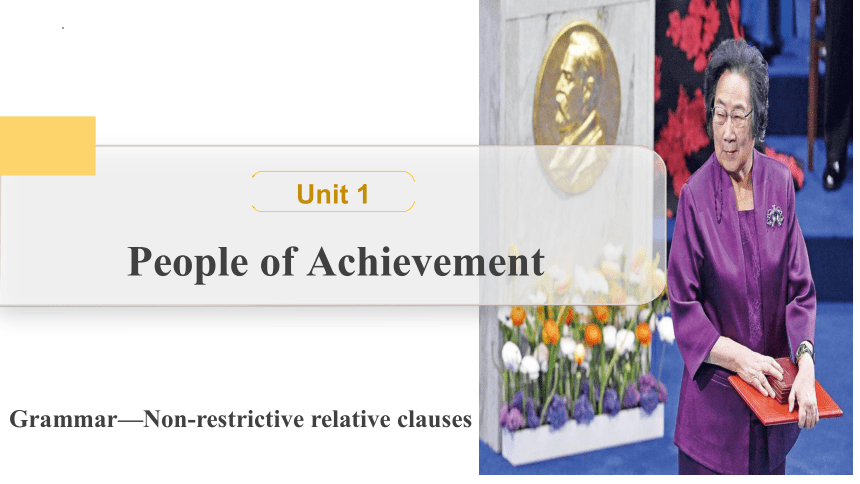 | |
| 格式 | pptx | ||
| 文件大小 | 2.2MB | ||
| 资源类型 | 教案 | ||
| 版本资源 | 人教版(2019) | ||
| 科目 | 英语 | ||
| 更新时间 | 2023-09-07 17:02:01 | ||
图片预览

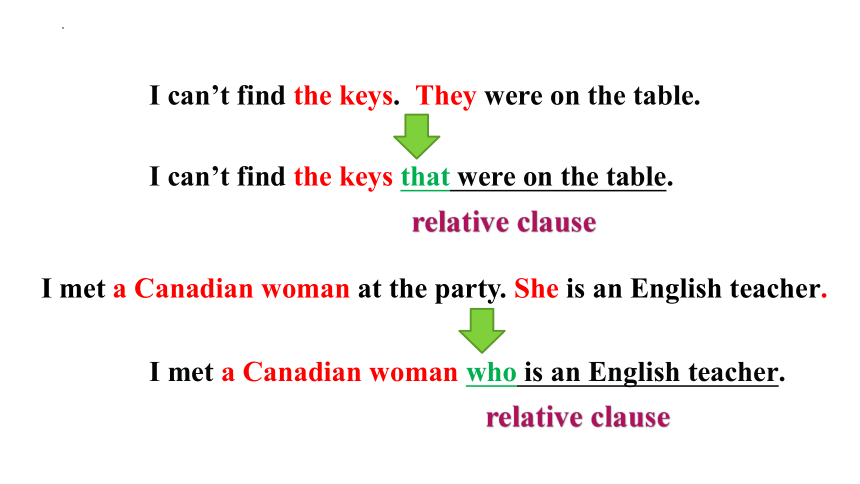
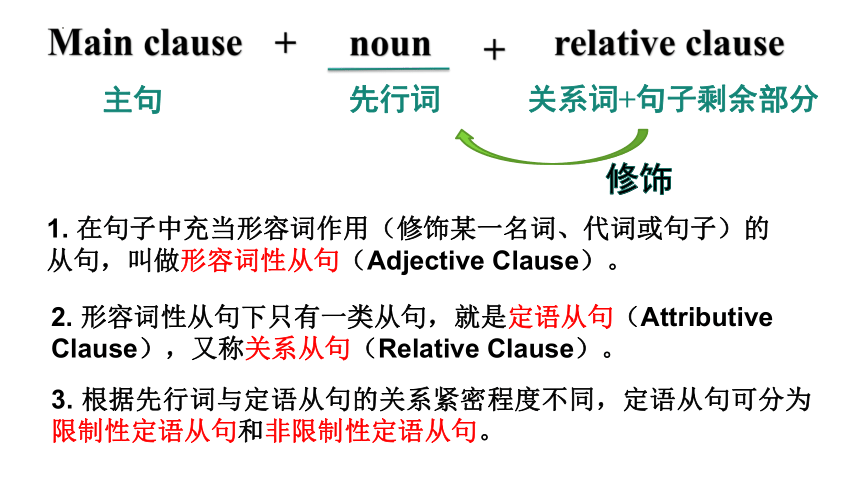
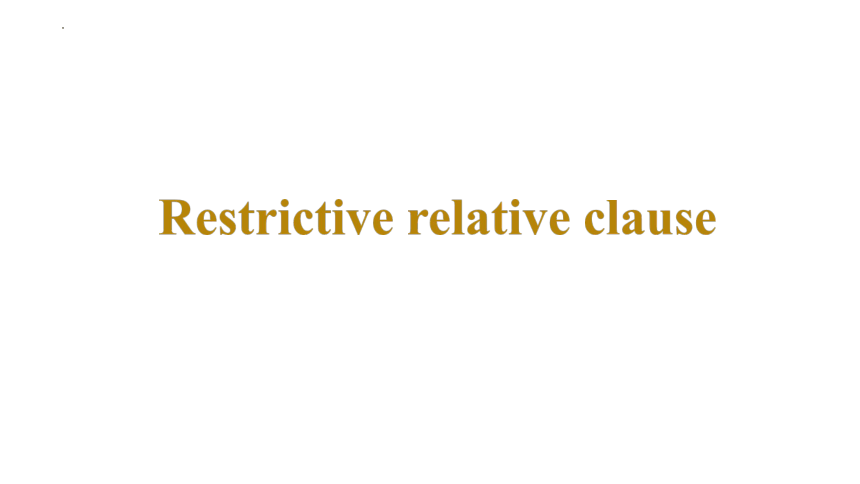
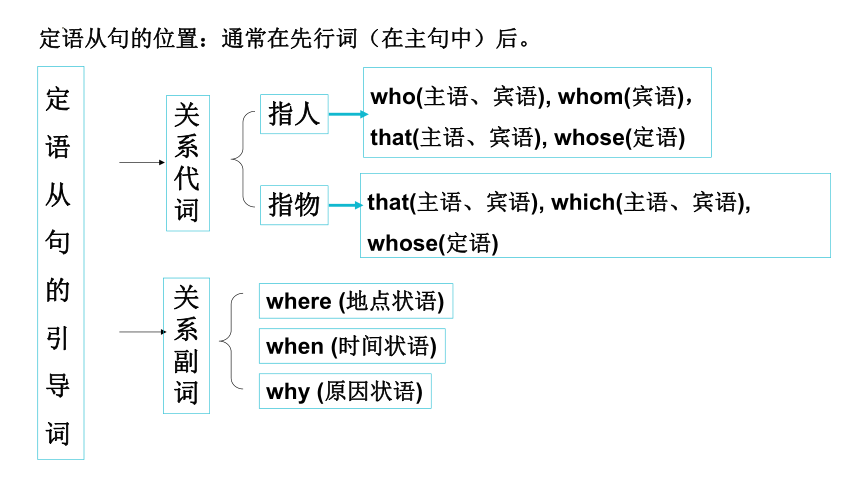
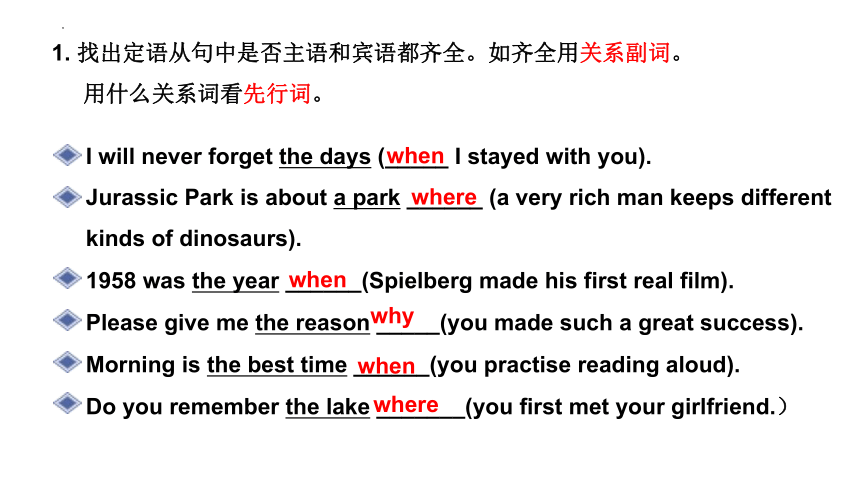
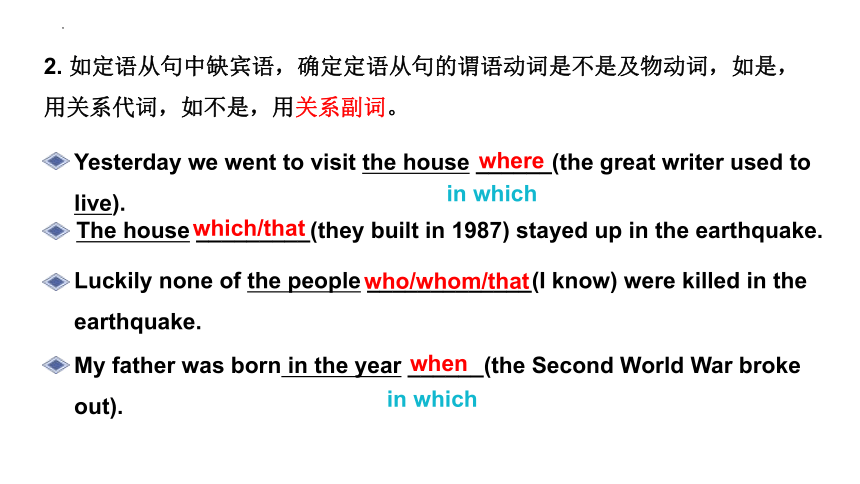
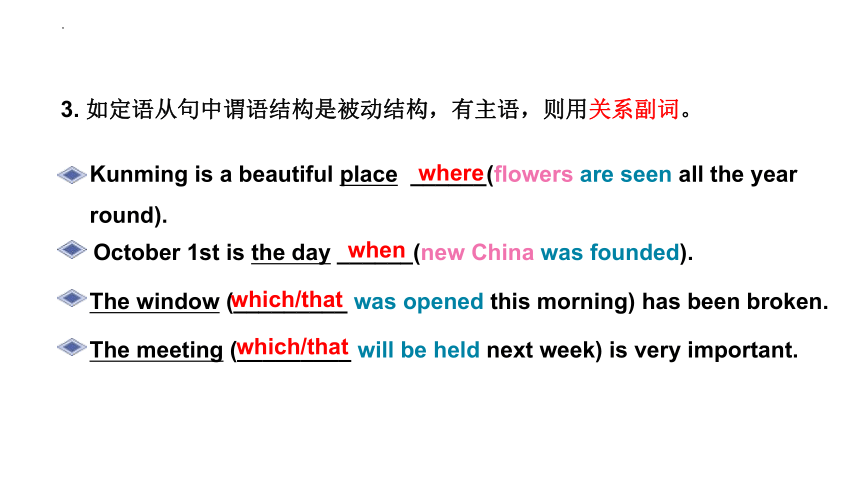

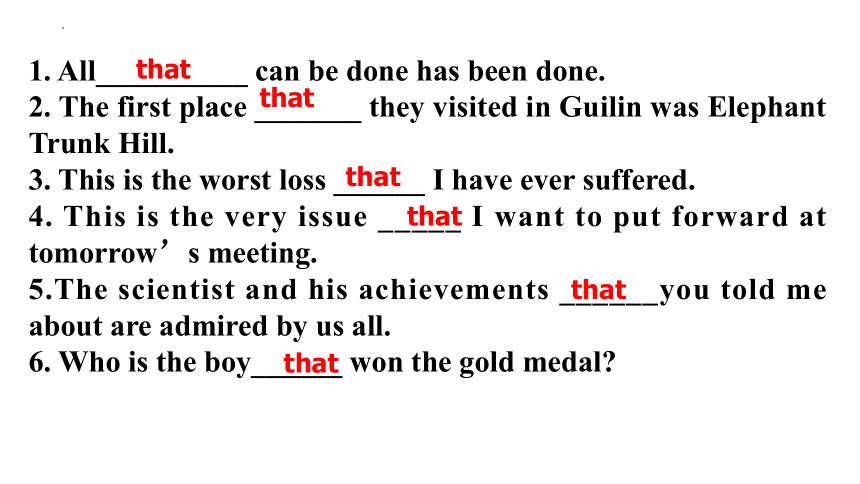

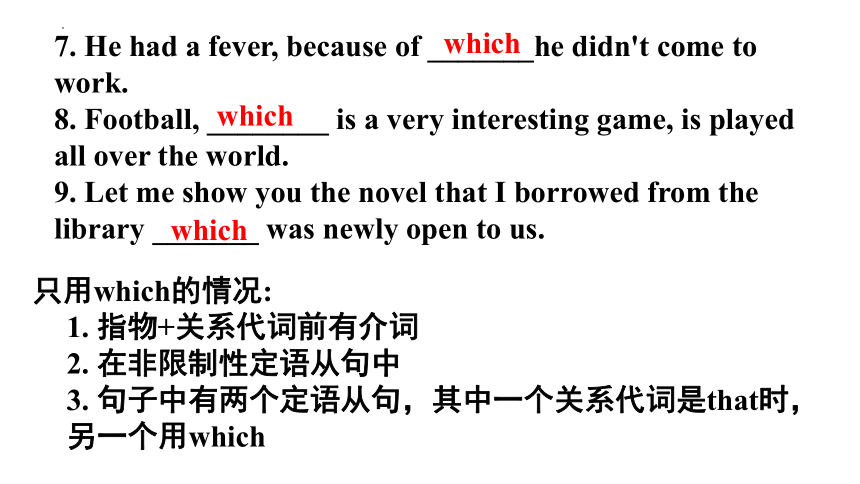
文档简介
(共47张PPT)
People of Achievement
Unit 1
Grammar—Non-restrictive relative clauses
I met a Canadian woman at the party. She is an English teacher.
I can’t find the keys. They were on the table.
I met a Canadian woman who is an English teacher.
I can’t find the keys that were on the table.
relative clause
relative clause
relative clause
+
noun
先行词
Main clause
+
关系词+句子剩余部分
主句
1. 在句子中充当形容词作用(修饰某一名词、代词或句子)的从句,叫做形容词性从句(Adjective Clause)。
修饰
2. 形容词性从句下只有一类从句,就是定语从句(Attributive Clause),又称关系从句(Relative Clause)。
3. 根据先行词与定语从句的关系紧密程度不同,定语从句可分为限制性定语从句和非限制性定语从句。
Restrictive relative clause
定语从句的位置:通常在先行词(在主句中)后。
定语
从句
的引
导词
关系代词
关系
副词
指人
指物
who(主语、宾语), whom(宾语),
that(主语、宾语), whose(定语)
that(主语、宾语), which(主语、宾语), whose(定语)
where (地点状语)
when (时间状语)
why (原因状语)
1. 找出定语从句中是否主语和宾语都齐全。如齐全用关系副词。
用什么关系词看先行词。
I will never forget the days (_____ I stayed with you).
when
Jurassic Park is about a park ______ (a very rich man keeps different
kinds of dinosaurs).
where
1958 was the year ______(Spielberg made his first real film).
Please give me the reason _____(you made such a great success).
when
why
Morning is the best time ______(you practise reading aloud).
when
Do you remember the lake _______(you first met your girlfriend.)
where
2. 如定语从句中缺宾语,确定定语从句的谓语动词是不是及物动词,如是,用关系代词,如不是,用关系副词。
Yesterday we went to visit the house ______(the great writer used to live).
where
in which
The house _________(they built in 1987) stayed up in the earthquake.
which/that
Luckily none of the people _____________(I know) were killed in the earthquake.
who/whom/that
My father was born in the year ______(the Second World War broke out).
in which
when
3. 如定语从句中谓语结构是被动结构,有主语,则用关系副词。
Kunming is a beautiful place ______(flowers are seen all the year round).
where
October 1st is the day ______(new China was founded).
when
The window (_________ was opened this morning) has been broken.
which/that
The meeting (_________ will be held next week) is very important.
which/that
关系代词注意点
1. All__________ can be done has been done.
2. The first place _______ they visited in Guilin was Elephant Trunk Hill.
3. This is the worst loss ______ I have ever suffered.
4. This is the very issue _____ I want to put forward at tomorrow’s meeting.
5.The scientist and his achievements ______you told me about are admired by us all.
6. Who is the boy______ won the gold medal
that
that
that
that
that
that
只用that的情况:
1. the +序数词/形容词最高级
2. 不定代词: all, much, few, little, something, everything, anything, nothing, none等
3. 同时指人又指物
4. 主句的主语是which或who
5. the very/only/same; no, one of
只用which的情况:
1. 指物+关系代词前有介词
2. 在非限制性定语从句中
3. 句子中有两个定语从句,其中一个关系代词是that时,另一个用which
7. He had a fever, because of _______he didn't come to work.
8. Football, ________ is a very interesting game, is played all over the world.
9. Let me show you the novel that I borrowed from the library _______ was newly open to us.
which
which
which
10. He _____ doesn’t reach the Great Wall is not a true man.
=Those _____ don’t reach the Great Wall are not true men.
11. Anybody _____ breaks the law should be punished.
12. He feels honored to work with Mr. Li, _____ has good reputation in the business.
13. In the oil painting, the state of angels _____ smiled at each other delivered the artist’s emotion.
who
who
who
who
who
只能用who的情况:
1. 先行词是人,并且在从句中作主语
2. 在非限定性定语从句中作主语,并指人
3. 先行词是god、angel、fairy等词时,只用who
4. 先行词是指人的不定代词one, ones, anyone, those
关系副词注意点
1. 当先行词和其前面的介词在定语从句中作 ,即定语从句不缺主语、宾语或者表语时,通常要用关系副词引导定语从句。常用的关系副词有_________ 。
状语
where,
when,why
1. I shall never forget the day when we first met in a park.
2. This is the reason why you should leave.
3. My favorite city is Beijing where I can visit the Great Wall.
作时间状语
作原因状语
作地点状语
先行词(时间名词)+when+句子
先行词(reason)+why+句子
先行词(地点名词)+where+句子
2. 并非先行词是表示时间、地点和原因的词时都用when, where, why,若先行词在定语从句中不作状语,而是作主语或宾语,就必须用which或that。
1. We often think of the days ______we spent together in the countryside.
2. We believe the reason ______ he told us.
which在定语从句中作宾语
which
that
1. This is the factory ________ I visited last year.
2. This is the factory _______ I worked last year.
3. This is the factory _______ produces all kinds of TV sets.
A. where B. which C. whom D. whose
which
where
which
1. They’ll never forget July 1 _____ Hong Kong returned to its motherland.
2. The days ______ we used foreign oil are gone forever.
when
= on which
when
= on which
Do you know the reason why she was late
It rained heavily, for which he was late for the class.
关系副词when, where, why可以用适当的介词+which来替代。如:
when = in/on/at/during… + which,
where = in/on/at… + which,
why = for + which
介词用什么,看谓语动词/形容词/先行词的搭配
介词的位置非常灵活,有时放在关系代词之前,有时放在动词之后。
eg. 1. I won’t forget the date when I was born.
2. This is the room where I lived.
= This is the room which I lived in.
3. I don’t know the reason why he haven’t come today.
4. Tom still remembers the days when they lived in Tianjin.
(on which)
(in which)
(for which)
(in which)
4. The film (____________ I fell asleep) was very boring.
1. The painting (________ I looked) was painted by me.
at which
2. The book (___________ I heard) was written twenty years ago.
about which
3. The pen (__________ she wrote that book) can now be seen in a museum.
with which
5. Kunming is a beautiful place ______________(flowers are seen all the year round).
where/in which
6. I will never forgot the day ______________(I first met you on the ship).
when/ on which
during which
结论:只有当介词+关系代词充当地点状语、时间状语或原因状语时,才能用关系副词代替。
【即学即练】
1. The person ________ you should write is Mr. Ball.
to whom
2. Have you met the person ___________ he was speaking
3. He is the man ________ you can turn for help.
about whom
to whom
“介词+关系代词”前或后还可有some, any, none, all, both, neither, many, most, each, few等代词或者数词。如:
①He loves his parents deeply, ____________are very kind to him.
他深深地爱着他的父母,他们俩待他都很好。
②In the basket there are quite many apples, _____________have gone bad.
篮子里有好些苹果,有些已经坏了。
③There are forty students in our class in all, _____________are from big cities.
我们班总共有40个学生,大多数来自大城市。
④Up to now, he has written ten stories, ____________are about country life.
迄今为止,他写了10部小说,其中三部是关于农村生活的。
both of whom
some of which
most of whom
three of which
1. The farm ________ we worked ten years ago isn’t what it used to be.
2. This is the tree ___________ we used to play games.
3. The pen _________ he is writing now was bought yesterday.
4. The gas ____________ we can not live is called oxygen.
5. Jack introduced to me his friend _____________ I was not very familiar.
6. The clever boy dug a hole in the wall,____________he could see what was happening inside the house.
on which
under which
with which
without which
【即学即练】
with whom
through which
Non-Restrictive relative clause
正确区分限制性定语从句和非限制性定语从句
掌握 as引导非限制性定语从句的规则
能够写出正确的非限制性定语从句并完成相关练习
学习目标
1.This is the woman_______________spoke at the meeting.
先行词是表示人的名词,定语从句中缺少一个主语, 要用关代_______或_______
2.This is the woman _____________________our headteacher just spoke to.
先行词是表示人的名词,定语从句中缺少一个宾语,要用关代_______或________或______或省略。
3.This is the woman_________________son is a pianist.
先行词是表示人的名词,定语从句中缺少-一个定语,要用关代___________
4.This is the factory _____________ was built last year.
先行词是表示物的名词,定语从句中缺少一个主语,要用关代________或_______.
5.This is the factory___________________we visit every year.
先行词是表示物的名词,定语从句中缺少一个宾语,要用关代_______或_______或省略
who/that
who
that
who/whom/that/省略
who
whom
whose
whose
which/that
which
that
which/that/省略
which
that
that
回顾 找出先行词 定语从句 成分
6.This is the room___________________window faces south.
先行词是表示物的名词,定语从句中缺少一个定语,要用关代____________。
7.I will never forget the day__________________I joined the League:
先行词是表示时间的名词,定语从句中缺少一个时间状语,要用关副词__________。
8.This is the reason______________he came late.
先行词是表示原因的名词,定语从句中缺少一个原因状语,要用关副词_______。
9.This is the place___________________Lu Xun was born.
先行词是表示地点的名词,定语从句中缺少一个地点状语,要用关副词_________
when
when
where
where
why
why
whose
whose
1.This year’s Nobel Prize for Physiology or Medicine has been awarded to Tu Youyou (co-winner),whose research led to the discovery of artemisinin,a crucial new treatment for malaria.
今年的诺贝尔生理学或医学奖被授予屠呦呦(共同获奖者),他的研究导致了青蒿素的发现,这是一种治疗疟疾的重要新疗法。
2.In the beginning,Tu Youyou went to Hainan,where malaria was more common,to study malaria patients.
一开始,屠呦呦去了疟疾多发的海南,研究疟疾患者。
探究发现
3.Later,the medicine was tested on malaria patients,most of whom recovered.
后来,这种药物在疟疾患者身上进行了测试,大部分患者都康复了。
4.This medicine,which was called artemisinin,soon became a standard treatment for malaria.
这种药物被称为青蒿素,很快成为治疗疟疾的标准药物。
以上四个句子中分别包含一个 从句,被 与先行词隔开,称为 性定语从句。
非限制性定语从句的引导词可以用如whose,which等关系代词,如例句1、4;
也可以用where等关系副词,如例句2;
有时用不定代词+of+whom/which指代先行词或先行词的一部分。如例句 。
定语
逗号
非限制
3
restrictive & non-restrictive relative clauses
A defining relative clause gives us essential information.
It took me a while to get used to people who eat popcorn during the movie.
A non-defining relative clause gives us extra information.
The science fair, which lasted all day, ended with an awards ceremony.
This is the fact that/which/省略 I have collected till now.
The novel, which I read last night, is very interesting.
The man to whom you spoke is a teacher.
The professor has two sons, both of whom are interested in scientific research.
探究下列句子,完成表格
自主学习
名称 限制性定语从句 非限制性定语从句
意义/作用 从句与先行词关系______,对先行词的意义起_______作用,不可或缺 从句对_______或整个_____起________________等作用
结构 (不用逗号/用逗号)___________与主句隔开 (不用逗号/用逗号)_________与主句隔开
引导词 a.作从句宾语时__________(可省略/不可省略),介词之后的关系词___________(能省/不能省) a.作从句宾语时___________
(可省略/不可省略)介词之后的关系词___________(能省/不能省)
that/why (可以/不可以)用that/why引导从句 (可以/不可以)用that/why引导从句
名称 限制性定语从句 非限制性定语从句
意义/作用 从句与先行词关系_________,对先行词的意义起______作用,不可或缺 从句对_______或整个_____起______________________等作用
结构 (不用逗号/用逗号)___________与主句隔开 (不用逗号/用逗号)_________与主句隔开
引导词 a.作从句宾语时__________(可省略/不可省略),介词之后的关系词___________(能省/不能省) a.作从句宾语时___________
(可省略/不可省略)介词之后的关系词___________(能省/不能省)
that/why (可以/不可以)用that/why引导从句 (可以/不可以)用that/why引导从句
不用逗号
用逗号
可省略
不可省略
不能省
不能省
关系紧密
限定
先行词
主句
补充说明、解释、评论
非限制性定语从句与主句的关系不紧密,去掉从句,意思依然清楚完整。译成汉语时,限制性定语从句翻译作定语“的”,非限制性定语从句译成与主句并列的句子。
英译汉:
I have two foreign teachers,both of whom are from America.
我有两个外教,他们都来自美国。
The foreign teacher who comes from America teaches us literature.
从美国来的那位外教教我们文学。
点拨释疑
项目 as which
指代 引导的从句只能指代_____________ 引导的从句既可指代______________,又可指代_______________
位置 可位于主句_______、______或___________ 引导的从句不能位于主句_____
She has been late again, as was expected.
As we had expected, Tom passed the driving test.
Global warming, as we all know, has caused a lot of natural disasters.
These apple trees, which I planted three years ago, have not produced any fruit.
Tom passed the driving test, which made his parents very happy.
He said that he had never seen her before, which was not true.
探究下列句子,完成表格
自主学习
项目 as which
指代 引导的从句只能指代_____________ 引导的从句既可指代______________,又可指代_______________
位置 可位于主句_______、______或___________ 引导的从句不能位于主句_____
整个主句的内容
整个主句的内容
句子的一部分
之前
之中
之后
之前
探究下列句子,完成表格
She has been late again, as was expected.
As we had expected, Tom passed the driving test.
Global warming, as we all know, has caused a lot of natural disasters.
These apple trees, which I planted three years ago, have not produced any fruit.
Tom passed the driving test, which made his parents very happy.
He said that he had never seen her before, which was not true.
展示交流
as还常用在固定搭配中:
as is known to all 众所周知
as is often the case 情况常常如此
as is said above 如上所述
as is reported 正如报道的那样
as we expected 正如我们预料的那样
as is shown 正如所示
1.______ we expected, China has been an and powerful country.
2. _____is known to everybody, the moon travels round the earth once every month.
As
As
点拨释疑
1. 作为连词,引出非限定性定语从句时,代替整个主句
as在非限定性定语从句中作主语、宾语,且引出的从句位置比较灵活,可位于句首或句末,也可置于主句中间。通常均由逗号将其与主句隔开。一般翻译成“正如…, 就像…”
2. 作为连词,引导原因状语从句,因为 since, because
3. 作为连词,引导时间状语从句,当…时,随着 when, while
4. 作为介词,1)像… ,如同… 2)作为…
5. 作为副词,as +adj./adv. +as, 像…一样,如同…
You're as tall as your father.
As she grew older she gained in confidence.
As you were out, I left a message.
They were all dressed as clowns.
I respect him as a doctor.
屠呦呦, 一个坚定又有耐性的科学家, 于1930年12月30号出生于中国宁波。(1)并列句
__________________________________________________________
__________________________________________________________
(2)改成非限制性定语从句
____________________________________________________________________________________________________________________
Tu Youyou, a committed and patient scientist, was born in
Ningbo, China on 30 December 1930.
Tu Youyou, who is a committed and patient scientist, was born in Ningbo, China on 30 December 1930.
小小翻译家
归纳检测
Ⅰ.单句语法填空
1.He likes the beautiful city, he has lived for a long time.
2.The homeless man, I thought did not buy himself anything to eat,went back into the store.
3.There are two buildings,the larger of is apparently distinct.
4.Mr Smith, native language is English,can speak Chinese fluently.
5.We will be shown around some places, other novelists seldom go.
where
who
which
whose
where
归纳检测
Ⅱ.完成句子
1.Last week I passed the examination, .
上周我通过了考试,那是很重要的考试。
2.Tom was defeated in the game, .
汤姆在比赛中被打败了,这(件事)使他的父亲很生气。
3.The professor has two sons, are interested in scientific research.
教授有两个儿子,他们都对科学研究感兴趣。
which made his father very angry
both of whom
which was very vital
作业:
1. 整理非限制性定语从句笔记
2. 完成非限制性定语从句限时练
Thanks for your listening!
People of Achievement
Unit 1
Grammar—Non-restrictive relative clauses
I met a Canadian woman at the party. She is an English teacher.
I can’t find the keys. They were on the table.
I met a Canadian woman who is an English teacher.
I can’t find the keys that were on the table.
relative clause
relative clause
relative clause
+
noun
先行词
Main clause
+
关系词+句子剩余部分
主句
1. 在句子中充当形容词作用(修饰某一名词、代词或句子)的从句,叫做形容词性从句(Adjective Clause)。
修饰
2. 形容词性从句下只有一类从句,就是定语从句(Attributive Clause),又称关系从句(Relative Clause)。
3. 根据先行词与定语从句的关系紧密程度不同,定语从句可分为限制性定语从句和非限制性定语从句。
Restrictive relative clause
定语从句的位置:通常在先行词(在主句中)后。
定语
从句
的引
导词
关系代词
关系
副词
指人
指物
who(主语、宾语), whom(宾语),
that(主语、宾语), whose(定语)
that(主语、宾语), which(主语、宾语), whose(定语)
where (地点状语)
when (时间状语)
why (原因状语)
1. 找出定语从句中是否主语和宾语都齐全。如齐全用关系副词。
用什么关系词看先行词。
I will never forget the days (_____ I stayed with you).
when
Jurassic Park is about a park ______ (a very rich man keeps different
kinds of dinosaurs).
where
1958 was the year ______(Spielberg made his first real film).
Please give me the reason _____(you made such a great success).
when
why
Morning is the best time ______(you practise reading aloud).
when
Do you remember the lake _______(you first met your girlfriend.)
where
2. 如定语从句中缺宾语,确定定语从句的谓语动词是不是及物动词,如是,用关系代词,如不是,用关系副词。
Yesterday we went to visit the house ______(the great writer used to live).
where
in which
The house _________(they built in 1987) stayed up in the earthquake.
which/that
Luckily none of the people _____________(I know) were killed in the earthquake.
who/whom/that
My father was born in the year ______(the Second World War broke out).
in which
when
3. 如定语从句中谓语结构是被动结构,有主语,则用关系副词。
Kunming is a beautiful place ______(flowers are seen all the year round).
where
October 1st is the day ______(new China was founded).
when
The window (_________ was opened this morning) has been broken.
which/that
The meeting (_________ will be held next week) is very important.
which/that
关系代词注意点
1. All__________ can be done has been done.
2. The first place _______ they visited in Guilin was Elephant Trunk Hill.
3. This is the worst loss ______ I have ever suffered.
4. This is the very issue _____ I want to put forward at tomorrow’s meeting.
5.The scientist and his achievements ______you told me about are admired by us all.
6. Who is the boy______ won the gold medal
that
that
that
that
that
that
只用that的情况:
1. the +序数词/形容词最高级
2. 不定代词: all, much, few, little, something, everything, anything, nothing, none等
3. 同时指人又指物
4. 主句的主语是which或who
5. the very/only/same; no, one of
只用which的情况:
1. 指物+关系代词前有介词
2. 在非限制性定语从句中
3. 句子中有两个定语从句,其中一个关系代词是that时,另一个用which
7. He had a fever, because of _______he didn't come to work.
8. Football, ________ is a very interesting game, is played all over the world.
9. Let me show you the novel that I borrowed from the library _______ was newly open to us.
which
which
which
10. He _____ doesn’t reach the Great Wall is not a true man.
=Those _____ don’t reach the Great Wall are not true men.
11. Anybody _____ breaks the law should be punished.
12. He feels honored to work with Mr. Li, _____ has good reputation in the business.
13. In the oil painting, the state of angels _____ smiled at each other delivered the artist’s emotion.
who
who
who
who
who
只能用who的情况:
1. 先行词是人,并且在从句中作主语
2. 在非限定性定语从句中作主语,并指人
3. 先行词是god、angel、fairy等词时,只用who
4. 先行词是指人的不定代词one, ones, anyone, those
关系副词注意点
1. 当先行词和其前面的介词在定语从句中作 ,即定语从句不缺主语、宾语或者表语时,通常要用关系副词引导定语从句。常用的关系副词有_________ 。
状语
where,
when,why
1. I shall never forget the day when we first met in a park.
2. This is the reason why you should leave.
3. My favorite city is Beijing where I can visit the Great Wall.
作时间状语
作原因状语
作地点状语
先行词(时间名词)+when+句子
先行词(reason)+why+句子
先行词(地点名词)+where+句子
2. 并非先行词是表示时间、地点和原因的词时都用when, where, why,若先行词在定语从句中不作状语,而是作主语或宾语,就必须用which或that。
1. We often think of the days ______we spent together in the countryside.
2. We believe the reason ______ he told us.
which在定语从句中作宾语
which
that
1. This is the factory ________ I visited last year.
2. This is the factory _______ I worked last year.
3. This is the factory _______ produces all kinds of TV sets.
A. where B. which C. whom D. whose
which
where
which
1. They’ll never forget July 1 _____ Hong Kong returned to its motherland.
2. The days ______ we used foreign oil are gone forever.
when
= on which
when
= on which
Do you know the reason why she was late
It rained heavily, for which he was late for the class.
关系副词when, where, why可以用适当的介词+which来替代。如:
when = in/on/at/during… + which,
where = in/on/at… + which,
why = for + which
介词用什么,看谓语动词/形容词/先行词的搭配
介词的位置非常灵活,有时放在关系代词之前,有时放在动词之后。
eg. 1. I won’t forget the date when I was born.
2. This is the room where I lived.
= This is the room which I lived in.
3. I don’t know the reason why he haven’t come today.
4. Tom still remembers the days when they lived in Tianjin.
(on which)
(in which)
(for which)
(in which)
4. The film (____________ I fell asleep) was very boring.
1. The painting (________ I looked) was painted by me.
at which
2. The book (___________ I heard) was written twenty years ago.
about which
3. The pen (__________ she wrote that book) can now be seen in a museum.
with which
5. Kunming is a beautiful place ______________(flowers are seen all the year round).
where/in which
6. I will never forgot the day ______________(I first met you on the ship).
when/ on which
during which
结论:只有当介词+关系代词充当地点状语、时间状语或原因状语时,才能用关系副词代替。
【即学即练】
1. The person ________ you should write is Mr. Ball.
to whom
2. Have you met the person ___________ he was speaking
3. He is the man ________ you can turn for help.
about whom
to whom
“介词+关系代词”前或后还可有some, any, none, all, both, neither, many, most, each, few等代词或者数词。如:
①He loves his parents deeply, ____________are very kind to him.
他深深地爱着他的父母,他们俩待他都很好。
②In the basket there are quite many apples, _____________have gone bad.
篮子里有好些苹果,有些已经坏了。
③There are forty students in our class in all, _____________are from big cities.
我们班总共有40个学生,大多数来自大城市。
④Up to now, he has written ten stories, ____________are about country life.
迄今为止,他写了10部小说,其中三部是关于农村生活的。
both of whom
some of which
most of whom
three of which
1. The farm ________ we worked ten years ago isn’t what it used to be.
2. This is the tree ___________ we used to play games.
3. The pen _________ he is writing now was bought yesterday.
4. The gas ____________ we can not live is called oxygen.
5. Jack introduced to me his friend _____________ I was not very familiar.
6. The clever boy dug a hole in the wall,____________he could see what was happening inside the house.
on which
under which
with which
without which
【即学即练】
with whom
through which
Non-Restrictive relative clause
正确区分限制性定语从句和非限制性定语从句
掌握 as引导非限制性定语从句的规则
能够写出正确的非限制性定语从句并完成相关练习
学习目标
1.This is the woman_______________spoke at the meeting.
先行词是表示人的名词,定语从句中缺少一个主语, 要用关代_______或_______
2.This is the woman _____________________our headteacher just spoke to.
先行词是表示人的名词,定语从句中缺少一个宾语,要用关代_______或________或______或省略。
3.This is the woman_________________son is a pianist.
先行词是表示人的名词,定语从句中缺少-一个定语,要用关代___________
4.This is the factory _____________ was built last year.
先行词是表示物的名词,定语从句中缺少一个主语,要用关代________或_______.
5.This is the factory___________________we visit every year.
先行词是表示物的名词,定语从句中缺少一个宾语,要用关代_______或_______或省略
who/that
who
that
who/whom/that/省略
who
whom
whose
whose
which/that
which
that
which/that/省略
which
that
that
回顾 找出先行词 定语从句 成分
6.This is the room___________________window faces south.
先行词是表示物的名词,定语从句中缺少一个定语,要用关代____________。
7.I will never forget the day__________________I joined the League:
先行词是表示时间的名词,定语从句中缺少一个时间状语,要用关副词__________。
8.This is the reason______________he came late.
先行词是表示原因的名词,定语从句中缺少一个原因状语,要用关副词_______。
9.This is the place___________________Lu Xun was born.
先行词是表示地点的名词,定语从句中缺少一个地点状语,要用关副词_________
when
when
where
where
why
why
whose
whose
1.This year’s Nobel Prize for Physiology or Medicine has been awarded to Tu Youyou (co-winner),whose research led to the discovery of artemisinin,a crucial new treatment for malaria.
今年的诺贝尔生理学或医学奖被授予屠呦呦(共同获奖者),他的研究导致了青蒿素的发现,这是一种治疗疟疾的重要新疗法。
2.In the beginning,Tu Youyou went to Hainan,where malaria was more common,to study malaria patients.
一开始,屠呦呦去了疟疾多发的海南,研究疟疾患者。
探究发现
3.Later,the medicine was tested on malaria patients,most of whom recovered.
后来,这种药物在疟疾患者身上进行了测试,大部分患者都康复了。
4.This medicine,which was called artemisinin,soon became a standard treatment for malaria.
这种药物被称为青蒿素,很快成为治疗疟疾的标准药物。
以上四个句子中分别包含一个 从句,被 与先行词隔开,称为 性定语从句。
非限制性定语从句的引导词可以用如whose,which等关系代词,如例句1、4;
也可以用where等关系副词,如例句2;
有时用不定代词+of+whom/which指代先行词或先行词的一部分。如例句 。
定语
逗号
非限制
3
restrictive & non-restrictive relative clauses
A defining relative clause gives us essential information.
It took me a while to get used to people who eat popcorn during the movie.
A non-defining relative clause gives us extra information.
The science fair, which lasted all day, ended with an awards ceremony.
This is the fact that/which/省略 I have collected till now.
The novel, which I read last night, is very interesting.
The man to whom you spoke is a teacher.
The professor has two sons, both of whom are interested in scientific research.
探究下列句子,完成表格
自主学习
名称 限制性定语从句 非限制性定语从句
意义/作用 从句与先行词关系______,对先行词的意义起_______作用,不可或缺 从句对_______或整个_____起________________等作用
结构 (不用逗号/用逗号)___________与主句隔开 (不用逗号/用逗号)_________与主句隔开
引导词 a.作从句宾语时__________(可省略/不可省略),介词之后的关系词___________(能省/不能省) a.作从句宾语时___________
(可省略/不可省略)介词之后的关系词___________(能省/不能省)
that/why (可以/不可以)用that/why引导从句 (可以/不可以)用that/why引导从句
名称 限制性定语从句 非限制性定语从句
意义/作用 从句与先行词关系_________,对先行词的意义起______作用,不可或缺 从句对_______或整个_____起______________________等作用
结构 (不用逗号/用逗号)___________与主句隔开 (不用逗号/用逗号)_________与主句隔开
引导词 a.作从句宾语时__________(可省略/不可省略),介词之后的关系词___________(能省/不能省) a.作从句宾语时___________
(可省略/不可省略)介词之后的关系词___________(能省/不能省)
that/why (可以/不可以)用that/why引导从句 (可以/不可以)用that/why引导从句
不用逗号
用逗号
可省略
不可省略
不能省
不能省
关系紧密
限定
先行词
主句
补充说明、解释、评论
非限制性定语从句与主句的关系不紧密,去掉从句,意思依然清楚完整。译成汉语时,限制性定语从句翻译作定语“的”,非限制性定语从句译成与主句并列的句子。
英译汉:
I have two foreign teachers,both of whom are from America.
我有两个外教,他们都来自美国。
The foreign teacher who comes from America teaches us literature.
从美国来的那位外教教我们文学。
点拨释疑
项目 as which
指代 引导的从句只能指代_____________ 引导的从句既可指代______________,又可指代_______________
位置 可位于主句_______、______或___________ 引导的从句不能位于主句_____
She has been late again, as was expected.
As we had expected, Tom passed the driving test.
Global warming, as we all know, has caused a lot of natural disasters.
These apple trees, which I planted three years ago, have not produced any fruit.
Tom passed the driving test, which made his parents very happy.
He said that he had never seen her before, which was not true.
探究下列句子,完成表格
自主学习
项目 as which
指代 引导的从句只能指代_____________ 引导的从句既可指代______________,又可指代_______________
位置 可位于主句_______、______或___________ 引导的从句不能位于主句_____
整个主句的内容
整个主句的内容
句子的一部分
之前
之中
之后
之前
探究下列句子,完成表格
She has been late again, as was expected.
As we had expected, Tom passed the driving test.
Global warming, as we all know, has caused a lot of natural disasters.
These apple trees, which I planted three years ago, have not produced any fruit.
Tom passed the driving test, which made his parents very happy.
He said that he had never seen her before, which was not true.
展示交流
as还常用在固定搭配中:
as is known to all 众所周知
as is often the case 情况常常如此
as is said above 如上所述
as is reported 正如报道的那样
as we expected 正如我们预料的那样
as is shown 正如所示
1.______ we expected, China has been an and powerful country.
2. _____is known to everybody, the moon travels round the earth once every month.
As
As
点拨释疑
1. 作为连词,引出非限定性定语从句时,代替整个主句
as在非限定性定语从句中作主语、宾语,且引出的从句位置比较灵活,可位于句首或句末,也可置于主句中间。通常均由逗号将其与主句隔开。一般翻译成“正如…, 就像…”
2. 作为连词,引导原因状语从句,因为 since, because
3. 作为连词,引导时间状语从句,当…时,随着 when, while
4. 作为介词,1)像… ,如同… 2)作为…
5. 作为副词,as +adj./adv. +as, 像…一样,如同…
You're as tall as your father.
As she grew older she gained in confidence.
As you were out, I left a message.
They were all dressed as clowns.
I respect him as a doctor.
屠呦呦, 一个坚定又有耐性的科学家, 于1930年12月30号出生于中国宁波。(1)并列句
__________________________________________________________
__________________________________________________________
(2)改成非限制性定语从句
____________________________________________________________________________________________________________________
Tu Youyou, a committed and patient scientist, was born in
Ningbo, China on 30 December 1930.
Tu Youyou, who is a committed and patient scientist, was born in Ningbo, China on 30 December 1930.
小小翻译家
归纳检测
Ⅰ.单句语法填空
1.He likes the beautiful city, he has lived for a long time.
2.The homeless man, I thought did not buy himself anything to eat,went back into the store.
3.There are two buildings,the larger of is apparently distinct.
4.Mr Smith, native language is English,can speak Chinese fluently.
5.We will be shown around some places, other novelists seldom go.
where
who
which
whose
where
归纳检测
Ⅱ.完成句子
1.Last week I passed the examination, .
上周我通过了考试,那是很重要的考试。
2.Tom was defeated in the game, .
汤姆在比赛中被打败了,这(件事)使他的父亲很生气。
3.The professor has two sons, are interested in scientific research.
教授有两个儿子,他们都对科学研究感兴趣。
which made his father very angry
both of whom
which was very vital
作业:
1. 整理非限制性定语从句笔记
2. 完成非限制性定语从句限时练
Thanks for your listening!
